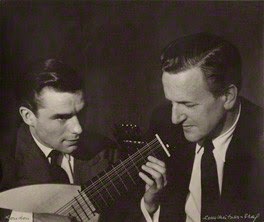So...I only logged in one solitary post here in 2014.
The main reason for this is that 2014 was quite simply an incredibly busy year. I mean that in the sense that it was both incredible and it was busy. That said, I've not totally abandoned this blogging thing in any way whatsoever. I simply took a bit of a hiatus. Hiatus over.
I've had the subject of beginnings floating around in my head as 2014 turned into 2015 - it's a topic that frequently occupies my mind around this time each year. Perhaps that is a large part of why I feel compelled to end this holiday from the blogosphere (do people even call it that anymore?). It's the time of year for fresh starts, I guess.
 |
Rehearsal with the San Francisco Symphony this morning
photo credit: Lolly Lewis |
Speaking of beginnings, I begin my string of 2015 performances tonight here in my new home of San Francisco (layers upon layers of beginnings!) with a set of performances of excerpts from Britten's
Les Illuminations with the San Francisco Symphony in its new experimental performance space,
Soundbox (yet another beginning).
Britten composed
Les Illuminations in 1939,
during a heady, tumultuous, and life-changing time in his life, as well as in the world at large. With the world descending into violence and upheaval around him, and Britain being pulled into World War II, it was during this time that he crossed the Atlantic for the first time, following W.H Auden and Christopher Isherwood to the US. It was also during this time in America that Britten's relationship with Pears transformed from a professional friendship into the romantic partnership that would last until his death in 1976. The seventh song of the cycle (which we're unfortunately not performing on this weekend's program),
Being Beauteous, is even dedicated to Peter Pears.
Each time I return to a familiar piece in my repertoire (which
Les Illuminations is, for me), I find new layers of meaning open up to me upon revisiting it. This occurs for a variety of reasons, mostly ones that have to do with marinating, time, and age. This time is no different.
 |
| Arthur Rimbaud |
It's not difficult to see why Britten was attracted to the poetry of
Arthur Rimbaud, who's poetry comprises the texts of
Les Illuminations, during this time. Rimbaud's poetry reads much like an acid-trip - he views the seemingly mundane world around us through a haze of wonderment, insanity, and eccentricity. Cities and the people and things which inhabit them are seen as the gods and supernatural creatures of Greek mythology - the world is a wild and divine place, and these things which we normally take for granted are suddenly fantastical, beautiful and monstrous. With the home he knew in Great Britain and Europe seemingly falling into chaos as Hitler pushed towards another world war, and traveling around a foreign country far from home, it's understandable why he was drawn to these works. His world was turned upside-down, surely almost feeling like a surreality rather than a reality.
Thinking about this context in which he composed these songs, it feels timely to be singing such pieces about the savage and beautiful world in which we live. With the horrifying terrorist attacks in Paris these past few days all over the news, the world still seems like a savage and bewildering place. On a more personal level, my new home city, San Francisco, is also a strangely beautiful place: singing these songs this time, I find myself thinking a bit about the sense of wonder that I experience every time I look out at the Bay and its bridges, or the savage parade of characters that one passes by in the Castro every day.
There is one phrase that Britten was first drawn to when composing these songs, which repeats multiple times throughout the cycle:
J'ai seul la clef de cette parade sauvage
"I, alone, hold the key to this savage parade"
This is a bold statement for Britten to fixate on, yet, again, an understandable one. Here he was: a stranger in a strange land, a pacifist in a violent maelstrom, a gay man in a straight world...and an artist. An artist looking in from an outside perspective. In a way, it seems like Britten is making a declaration about himself as an artist here. As if he is saying, from here on out, this is how I am going to define my work - this is the beginning of a new chapter in my music. Listen up.
As beginnings go, I must say, it's an impressive and a beautiful one. I'm really grateful to get to perform parts of it tonight.



